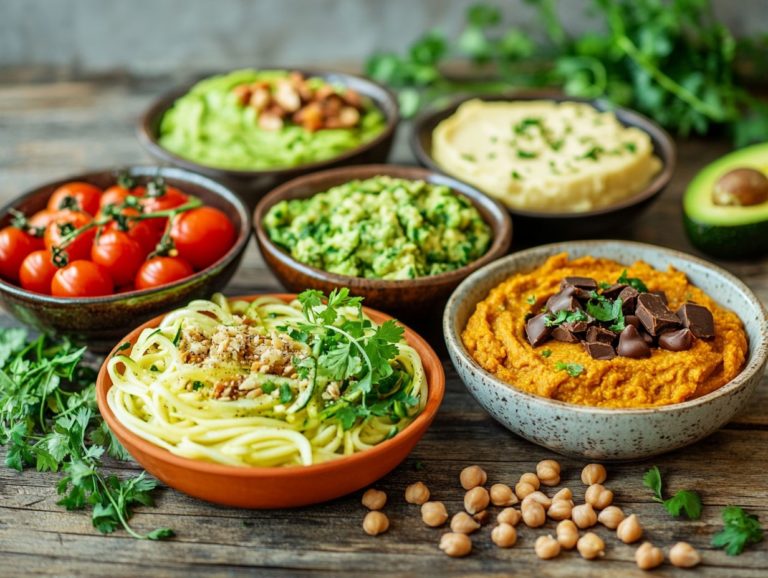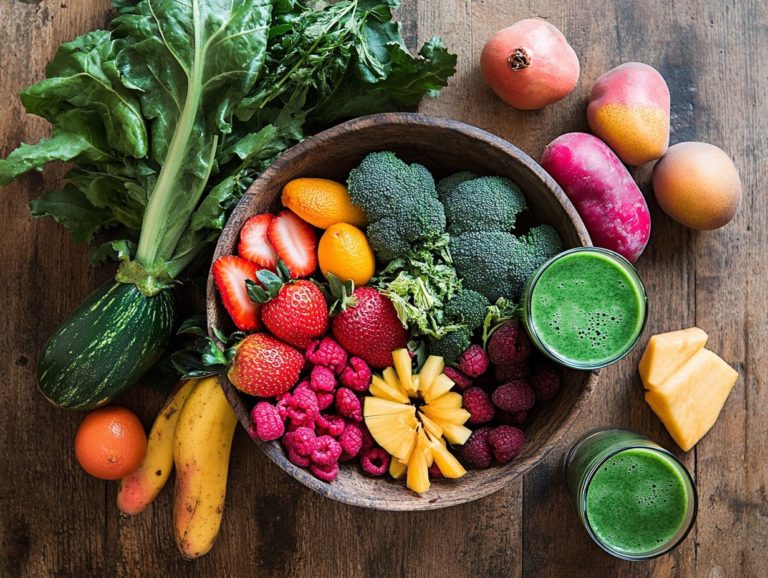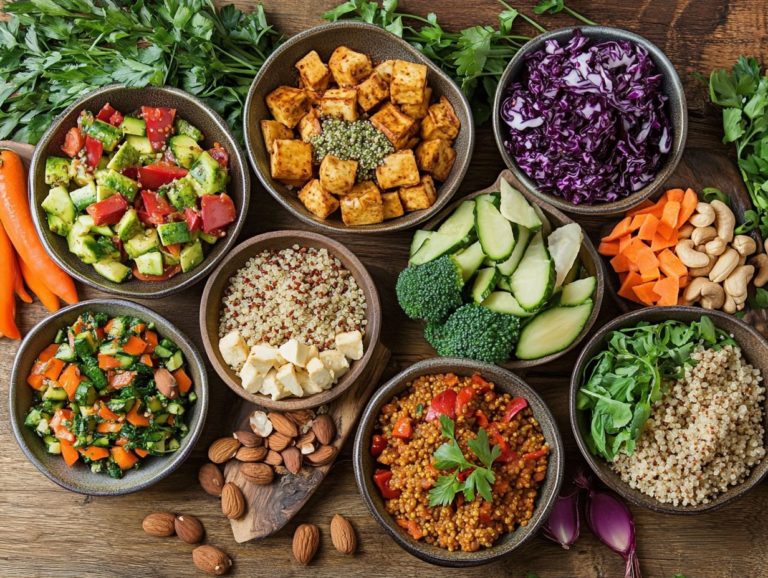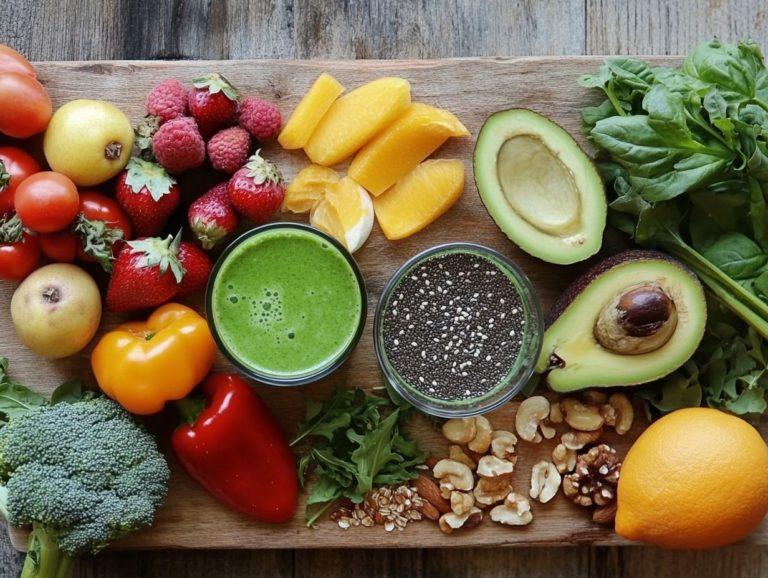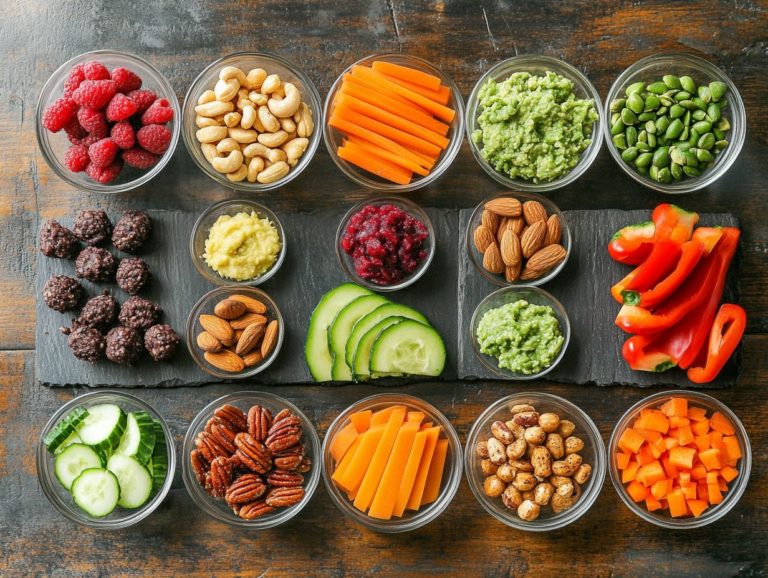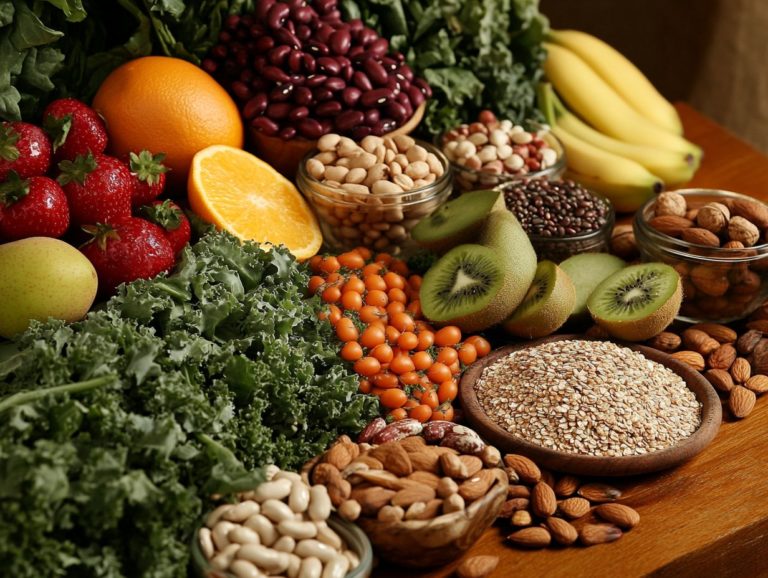The Basics of a Keto-Vegan Diet Explained
Are you curious about the intersection of keto and vegan diets? This article explores the essentials of a keto-vegan lifestyle, highlighting its health benefits and environmental impact.
Learn to plan meals with delicious recipes. You’ll also find how to tackle challenges like nutrient deficiencies.
You ll discover practical tips designed to support your success on this unique dietary journey. Whether you re a seasoned dieter or simply exploring new options, this guide provides invaluable insights to help you flourish.
Contents
- Key Takeaways:
- What is a Keto-Vegan Diet?
- Benefits of a Keto-Vegan Diet
- How to Follow a Keto-Vegan Diet
- Potential Challenges and Solutions
- Tips for Success on a Keto-Vegan Diet
- Frequently Asked Questions
- What is a Keto-Vegan Diet?
- How does a Keto-Vegan Diet differ from a traditional Keto Diet?
- What are the benefits of following a Keto-Vegan Diet?
- Is it challenging to follow a Keto-Vegan Diet?
- What are some examples of foods that are allowed on a Keto-Vegan Diet?
- Are there any potential challenges or drawbacks to following a Keto-Vegan Diet?
Key Takeaways:
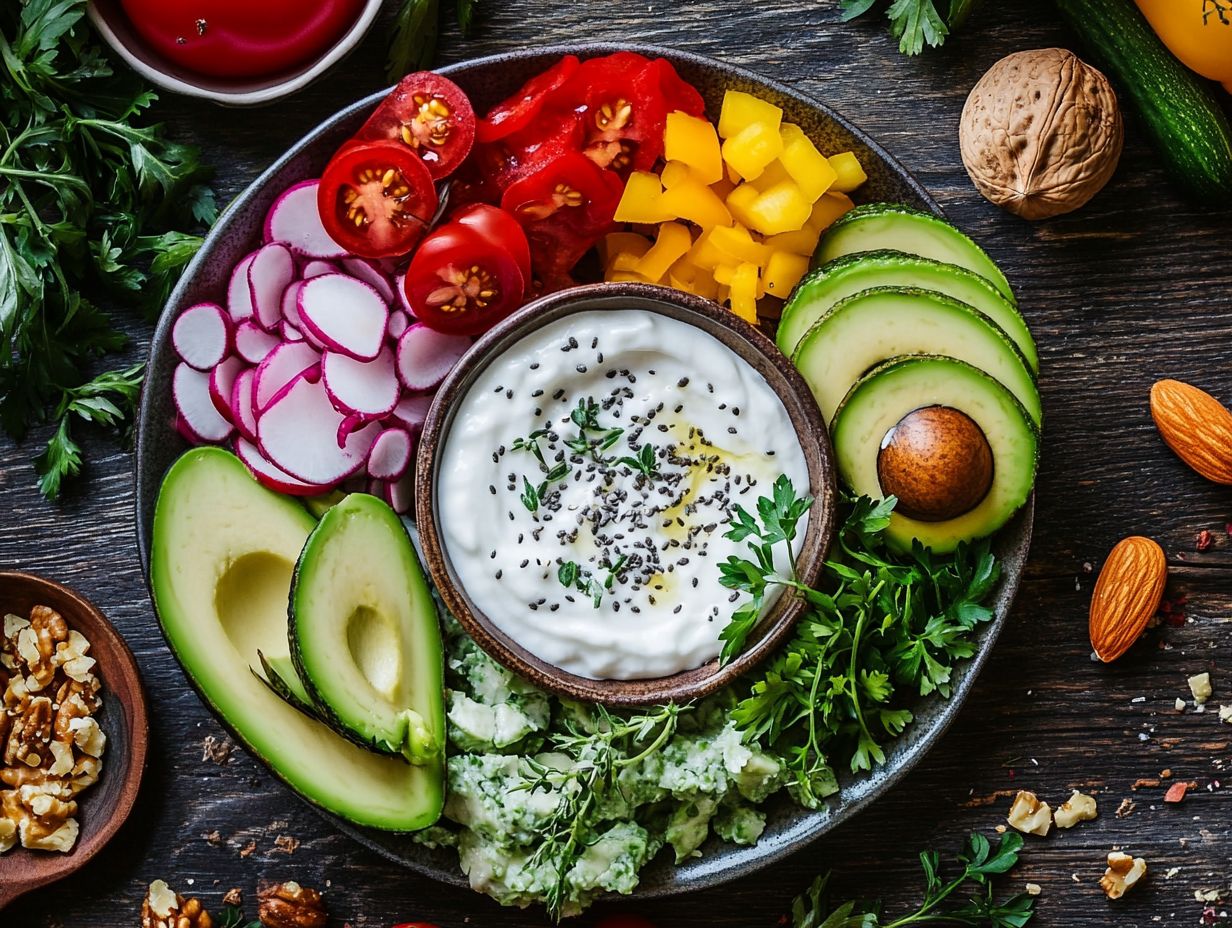
A keto-vegan diet combines the principles of veganism with those of the ketogenic diet, focusing on high-fat, moderate protein, and low-carb plant-based foods.
Benefits of a keto-vegan diet include improved health, weight management, and environmental sustainability.
To follow a keto-vegan diet, focus on whole, unprocessed plant-based foods and plan meals with balanced macros. You can address nutrient deficiencies with supplements and a variety of foods.
What is a Keto-Vegan Diet?
The Keto-Vegan Diet, often referred to as the Vegan Keto Diet, presents an effective diet that merges the principles of veganism with those of the ketogenic diet.
This innovative fusion encourages a plant-based lifestyle while emphasizing low carbohydrates and high fats to induce ketosis. This is a state where your body burns fat for energy instead of carbohydrates. By avoiding animal products, it directs your focus toward nutrient-dense foods rich in healthy fats and proteins, establishing a balanced macronutrient ratio that promotes weight loss and enhances overall health.
You’ll find yourself exploring a diverse array of fruits, vegetables, legumes, nuts, seeds, tofu, and tempeh as your primary food sources. This ensures that you meet your nutritional requirements while seamlessly integrating both dietary philosophies.
Understanding the Combination
Understanding the blend of veganism and the ketogenic diet unveils a fascinating dietary model that emphasizes plant-based foods while significantly cutting carbohydrates to encourage fat utilization for energy.
This intricate interplay boosts metabolic flexibility, enabling your body to transition from relying on glucose to efficiently burning stored fats. At the core of this approach are macronutrients carbohydrates, fats, and proteins which each play vital roles in your dietary journey.
By thoughtfully choosing high-fat, low-carb vegan foods like avocados, nuts, and seeds, you can maintain ketotic states while still nourishing your body with essential vitamins and minerals.
For those embarking on this unique path, incorporating legumes, leafy greens, and plant-based proteins is key to ensuring you receive adequate nutrition. This careful balance not only supports your energy levels but also enhances your overall health and well-being.
Benefits of a Keto-Vegan Diet
A Keto-Vegan Diet does more than help you lose weight; it offers numerous health benefits! This diet can lead to improved management of chronic conditions, better blood sugar control for those with diabetes, and even an uplifted mood, thanks to a balanced intake of macronutrients and micronutrients sourced from plants.
Embracing this lifestyle can truly transform not just your body, but your mind and spirit as well.
Health and Environmental Advantages
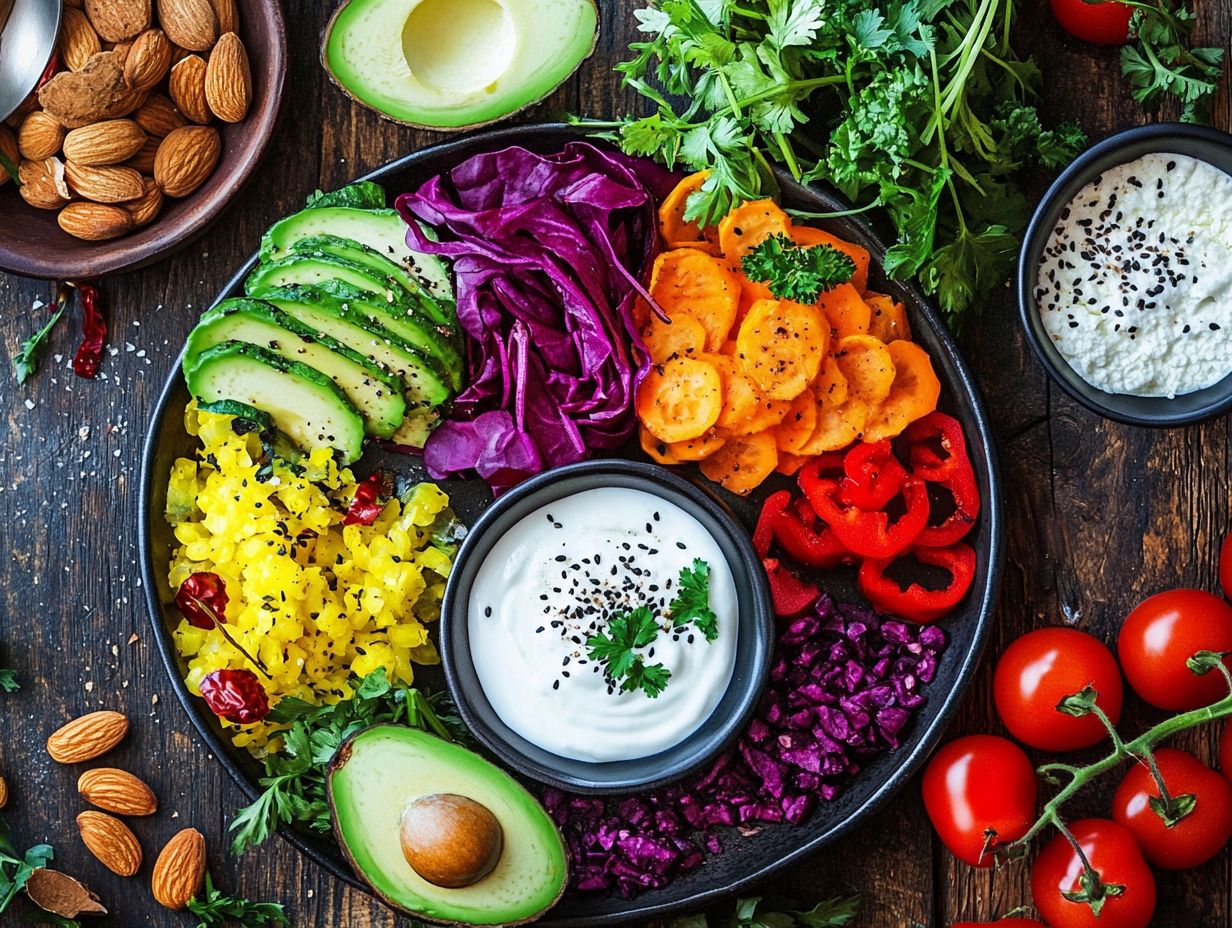
Adopting a Keto-Vegan Diet not only unlocks remarkable health benefits but also champions environmental sustainability.
By reducing your consumption of animal products, you play a part in lowering greenhouse gas emissions and minimizing your ecological footprint. This dietary approach centers on whole, plant-based foods that are brimming with nutrients and healthy fats. These foods are linked to enhanced metabolic health and a reduced risk of chronic diseases like diabetes and heart disease.
The connection between your personal health and the planet’s well-being becomes strikingly clear when you recognize that every meal choice nourishes your body while alleviating pressure on our natural resources.
By fully embracing plant-based eating, you contribute to a more ethical food system, advocating for animal welfare and making a significant positive impact on climate change.
Ultimately, your lifestyle choices reflect a commitment not only to your own health but also to fostering a compassionate and sustainable world.
How to Follow a Keto-Vegan Diet
Embracing a successful Keto-Vegan Diet requires thoughtful meal planning that highlights low-carb, high-fat foods. It s essential to get enough protein from a variety of vegan sources.
Think legumes, nuts, seeds, tofu, and tempeh each contributing to a well-rounded nutritional profile. Exciting options await!
Enhance your cooking experience with flavorful recipes and healthy cooking oils rich in fats. This allows you to savor every bite while meeting your dietary goals.
Meal Planning and Sample Recipes
Effective meal planning for a Keto-Vegan Diet is crucial for keeping your meals low in carbs and packed with nutrients. Incorporating a variety of recipes featuring ingredients like nutritional yeast a cheese-flavored ingredient often used in vegan cooking and healthy oils can elevate your cooking.
Explore combinations of vegetables, nuts, and seeds to create satisfying dishes adhering to ketogenic and vegan principles. For example, using cauliflower rice as a base for stir-fried meals keeps the carb count in check and adds a hearty texture that pairs beautifully with sauces made from avocado and coconut cream.
Spices such as turmeric and cumin can take your meals to the next level, providing delightful taste and health benefits. You ll love experimenting with keto-friendly desserts like avocado chocolate mousse; it s a delicious way to satisfy sweet cravings while staying on track.
Potential Challenges and Solutions
While the Vegan Keto Diet offers many benefits, it also has challenges, particularly regarding nutrient deficiencies due to restricted food options. You need a thoughtful approach to address possible nutritional needs.
Addressing Nutrient Deficiencies
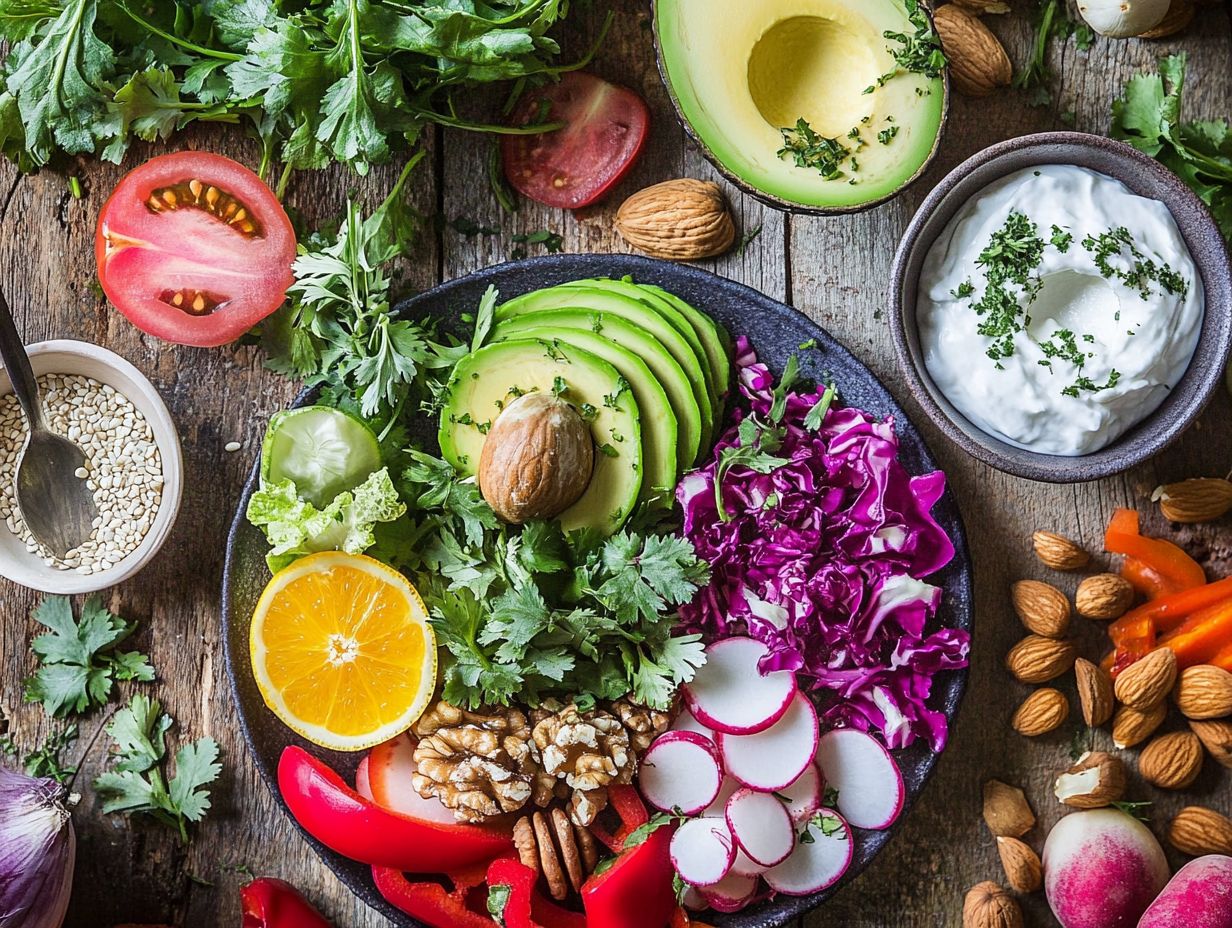
Addressing potential nutrient deficiencies is essential. Pay particular attention to your B vitamin levels, especially B12, which is critical for nerve function and forming red blood cells. Consider incorporating fortified foods or B12 supplements to fulfill these needs.
Omega-3 fatty acids are also vital for heart and brain health. Look to sources like flaxseeds, chia seeds, and walnuts for excellent vegan options.
Regarding iron essential for oxygen transport in your blood lentils, chickpeas, and quinoa are fantastic sources. Pair these with vitamin C-rich foods to enhance absorption.
Tips for Success on a Keto-Vegan Diet
To thrive on a Keto-Vegan Diet, embrace practical advice and use resources that help you cultivate sustainable habits. This approach helps you make informed choices that align with your health goals and ethical values.
Practical Advice and Resources
Practical advice and resources for following a Vegan Keto Diet can elevate your cooking experience. By exploring cookbooks that specialize in this diet alongside websites dedicated to plant-based ketogenic recipes, you ll uncover a treasure trove of innovative dishes.
Engage with online communities, such as forums and social media groups, to exchange tips on meal prepping and cooking techniques, ensuring each meal you create is nutritious and satisfying.
To access reliable information, follow reputable bloggers and dietitians who focus on the Keto-Vegan lifestyle. This will keep you informed about the latest trends and nutritional advice while making the most of your culinary journey.
Frequently Asked Questions
Join our community to share your Keto-Vegan recipes!
What is a Keto-Vegan Diet?
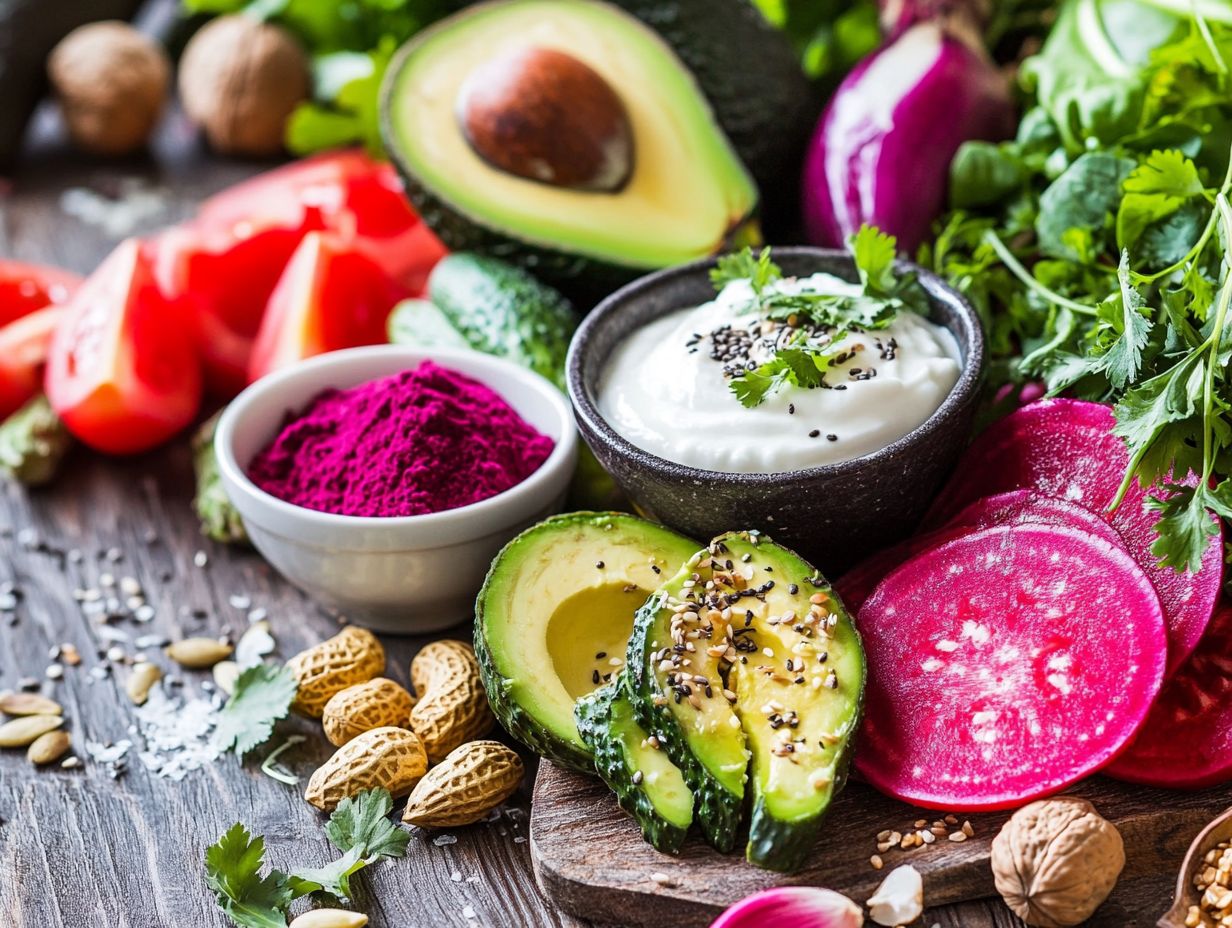
A Keto-Vegan Diet combines a ketogenic diet with a vegan diet. This means it is high in fat, low in carbohydrates, and excludes all animal products.
How does a Keto-Vegan Diet differ from a traditional Keto Diet?
A traditional Keto Diet includes foods like meat and dairy. In contrast, a Keto-Vegan Diet uses plant-based fats and proteins instead.
What are the benefits of following a Keto-Vegan Diet?
Experience amazing health benefits with a Keto-Vegan Diet! Enjoy weight loss, better heart health, and improved energy levels.
Is it challenging to follow a Keto-Vegan Diet?
Adjusting to a Keto-Vegan Diet takes time and effort. However, with proper planning, it becomes manageable!
What are some examples of foods that are allowed on a Keto-Vegan Diet?
Enjoy delicious foods like avocados, nuts, coconut oil, and tofu. These are high in healthy fats and perfect for your keto-vegan lifestyle!
Are there any potential challenges or drawbacks to following a Keto-Vegan Diet?
Ensuring you get enough nutrients, like vitamin B12, can be tricky. Consult a healthcare professional to consider necessary supplements.

